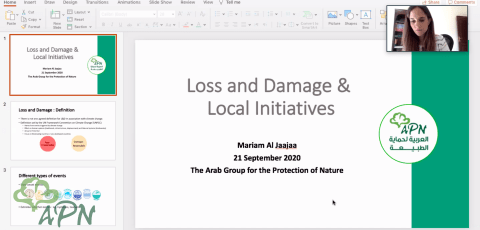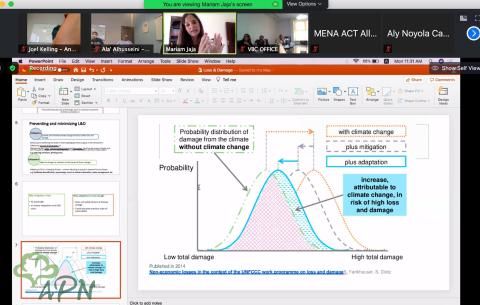
At the invitation of ACT Alliance, APN General Manager Mariam Al Jaajaa presented a lecture on the losses and damages caused by climate change (21 September 2020). She spoke about the experiences of APN as a successful model in mitigating climate change and helping small farmers adapt with it.
ACT Alliance is a global coalition of more than 145 churches and affiliated organizations working together in 140 countries to bring about positive and sustainable change in the lives of the poor and marginalized.
The lecture covered three main topics: the social, economic, and political impacts of climate change; the effects of climate change in Jordan in particular; and APN's tree-planting campaigns in Jordan and Palestine as local initiatives playing an important role in climate change mitigation and adaptation.
On the first topic, Al Jaajaa first gave an overview of the history of international negotiations on climate change. She then highlighted the importance of climate justice by holding industrialized countries responsible for their emissions and creating a mechanism for compensating less developed countries. She also stressed the need to support developing countries lobby and unite efforts to guarantee the rights of the affected people.
When discussing Jordan, Al Jaajaa explained that the temperature has increased from 0.3 to 2.8 degrees Celsius since 1960. Rainfall rates have decreased by 5-20% in most regions, which has increased heatwaves and dry days. Climate change was also manifested in shorter rainy seasons, causing heavy rainfall to the point of floods devastating crops and exposing infrastructure to significant losses as was the case in the winter of 2019. Al Jaajaa also spoke about weaknesses in legal frameworks and institutions which make them unfit to protect agricultural lands and biodiversity accelerating the process of desertification. She concluded by stating that the situation will continue to deteriorate and reach alarming levels in the year 2100, according to calculations if the world does not find effective ways to limit climate change.
Al Jaajaa spoke about APN's experience with tree-planting campaigns in which more than 2.5 million trees were planted in Palestine and Jordan. The trees have contributed to mitigating climate change by absorbing vast amounts of carbon dioxide. The campaigns helped farmers cope by cultivating crops that suit the hot climate, using modern irrigation methods, and compensating farmers for losses by providing them with fruit trees in cases of frost, drought or floods.
At the end of the lecture, she warned that wars and occupation advance climate change and the loss and damage associated with it. She pointed out that conflicts increase environmental destruction and emission of toxic gases, and limit the ability of countries to adapt with climate change. Climate change in return increases the intensity of wars when sides compete for scarce natural resources.


